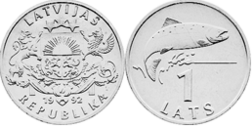Latvian lats
| Latvijas lats Template:Lv icon | |
|---|---|
 The standard version of 1 lats coin bears a salmon | |
| ISO 4217 | |
| Code | LVL |
| Unit | |
| Plural | lati (nom. pl.) or latu (gen. pl.) |
| Symbol | Ls (before numerals) |
| Denominations | |
| Subunit | |
| 1/100 | santīms |
| Plural | |
| santīms | santīmi (nom. pl.) or santīmu (gen. pl.) |
| Symbol | |
| santīms | s (after numerals) |
| Banknotes | 5, 10, 20, 50, 100, 500 latu |
| Coins | 1, 2, 5, 10, 20, 50 santīmu, 1, 2 lati |
| Demographics | |
| User(s) | |
| Issuance | |
| Central bank | Bank of Latvia |
| Website | www.bank.lv |
| Valuation | |
| Inflation | 10.1% |
| Source | The World Factbook, 2007 est. |
| EU Exchange Rate Mechanism (ERM) | |
| Since | 2 May 2005 |
| Fixed rate since | 1 January 2005 |
| Replaced by euro, cash | 1 January 2012 tentative |
| 1 € = | Ls 0.702804 |
| Band | pegged in practice[citation needed], 15% de jure |
- For common abbreviations, see LAT (disambiguation)
The lats (plural: lati, ISO 4217 currency code: LVL or 428) is the currency of Latvia. It is abbreviated as Ls. The lats is sub-divided into 100 santīmi (singular: santīms , plural also santīmi; from French centime).
First lats, 1922-1940

The lats were first introduced in 1922, replacing the Latvian rublis at a rate of 1 lats = 50 rubļi. In 1940, Latvia was incorporated into the USSR and the lats were replaced by the Soviet ruble at par.
Coins
Coins were issued in denominations of 1, 2, 5, 10, 20 and 50 santīmu, 1, 2 and 5 lati. Denominations of 1 lats and above were in silver.

Banknotes
The Latvian Bank issued notes from 1922 in denominations of 20, 25, 50, 100 and 500 latu. They also issued 10 latu notes which were 500 rubli notes overprinted with the new denomination. The government issued currency notes from 1925 in denominations of 10 and 20 latu.
Second lats, 1993-
The lats was reintroducted in 1993, replacing the Latvian rublis, which was used for short period after Latvia regained its independence, at a rate of 1 lats = 200 rubļu.
Coins
Coins are issued in denominations of 1 santīms, 2 & 5 santīmi, 10, 20 & 50 santīmu, as well as 1 lats and 2 lati. Also, there are commemorative coins in denominations of 2, 10, 20, 100 latu made from gold and silver.
Banknotes
| Current Series | |||||
|---|---|---|---|---|---|
| Image | Value | Main Colour | Description | ||
| Obverse | Reverse | Obverse | Reverse | ||
| File:5 lati Latvia 1992 avers.png | File:Ls5 2007 reverss e.gif | 5 lati | Green | Oak tree | |
| File:Ls10 2000 aver.gif | File:Ls10 2000 rever.gif | 10 latu | Purple | River Daugava | Sakt |
| File:Ls20a-2007-e.gif | File:Ls20b-2007-e.gif | 20 latu | Brownish-Green | Traditional house | |
| File:Ls50be-1992.gif | File:Ls50ae-1992.gif | 50 latu | Blue | Sailing-ship | Keys |
| File:Ls100-2007-av.jpg | File:Ls100-2007-rev.jpg | 100 Latu | Red | Krišjānis Barons | |
| File:Ls500be-1992.gif | File:Ls500ae-1992.gif | 500 Latu | Brown | Latvian folk-maid | |
Euro
Latvia has been a member of the European Union since 1 May 2004 and is a member of the Economic and Monetary Union of the European Union, but it has not completed the third stage of the EMU. The lats is in ERM II, and floats within 1% of the central rate, Ls 0.702804 = €1. Latvia had originally planned to adopt the euro as its official currency on 1 January 2008. It is now expected that Latvia will introduce the euro in 2012 at the earliest,[1] although the head of the National Bank of Latvia has suggested that 2013 may be a more realistic date.[2]
However, due to the current world financial crisis and the fact that Latvia is asking for help to the IMF, it is possible that the IMF will force Latvia to give up its currency peg as a precondition; taking officially Latvia out of the ERM II and possible moving the euro adoption date even further.[3]
| Current LVL exchange rates | |
|---|---|
| From Google Finance: | AUD CAD CHF CNY EUR GBP HKD JPY USD LTL EEK |
| From Yahoo! Finance: | AUD CAD CHF CNY EUR GBP HKD JPY USD LTL EEK |
| From XE.com: | AUD CAD CHF CNY EUR GBP HKD JPY USD LTL EEK |
| From OANDA: | AUD CAD CHF CNY EUR GBP HKD JPY USD LTL EEK |
Other updated currency rates: [1]. The lats is the fourth highest valued currency unit after the Kuwaiti dinar, Bahraini dinar, and the Omani rial.
See also
References
- ^ "Don't look for the Euro until after 2012". New Europe. 2007-08-18. Retrieved 2007-12-27.
- ^ "Bank targets 2013 as Latvia's 'E-day'". baltictimes.com. 2007-10-26. Retrieved 2007-10-28.
- ^ "€5bn question is whether IMF will force Latvia to give up currency peg". Business News Europe. Retrieved 2008-12-03.
